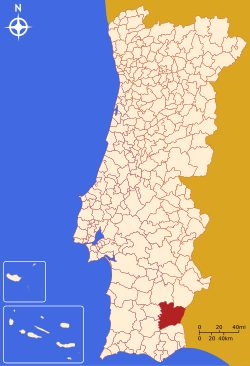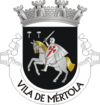Mértola
| Mértola | |||
|---|---|---|---|
| Municipality | |||
|
|||
 |
|||
| Coordinates: 37°38′25″N 7°39′40″W / 37.64028°N 7.66111°WCoordinates: 37°38′25″N 7°39′40″W / 37.64028°N 7.66111°W | |||
| Country |
|
||
| Region | Alentejo | ||
| Subregion | Baixo Alentejo | ||
| Intermunic. comm. | Baixo Alentejo | ||
| District | Beja | ||
| Parishes | 7 | ||
| Government | |||
| • President | Jorge Rosa (PS) | ||
| Area | |||
| • Total | 1,292.87 km2 (499.18 sq mi) | ||
| Population (2011) | |||
| • Total | 7,274 | ||
| • Density | 5.6/km2 (15/sq mi) | ||
| Time zone | WET/WEST (UTC+0/+1) | ||
| Website | Official website | ||
Mértola (Portuguese pronunciation: [ˈmɛɾtulɐ]) is a town and a municipality in southeastern Portugal next to the Spanish border. The population in 2011 was 7,274, in an area of 1292.87 km². In terms of land area, it is the sixth-largest municipality in Portugal. The resultant population density of 5.62 persons/km² is the second-lowest in Portugal, behind only that of adjacent Alcoutim. The municipality is located in the southeastern part of Beja District, in the Lower Alentejo region.
The seat of the municipality is the town of Mértola, which has around 2800 inhabitants (2011). The town of Mértola is located on a hill by the Guadiana River, and its strategic location made it an important fluvial commercial port from Classical Antiquity through the period of Islamic domination. Among the vestiges of its past, Mértola's main church (Igreja de Nossa Senhora da Anunciação) was the only medieval mosque to have survived in Portugal.
The present Mayor is Jorge Rosa, elected by the Socialist Party.
During Classical Antiquity, Mértola was inhabited by Phoenicians, Carthaginians and finally the Romans, who called it Myrtilis Iulia. The strategic location of Mértola, on a hill by the northernmost navigable part of the Guadiana river, was crucial in its early development. Agricultural products grown in the villae nearby and valuable minerals (silver, gold and tin) obtained from the lower Alentejo region were sent from the fluvial port of Mértola via the Guadiana to Southern Hispania and the Mediterranean. The town was raised to the status of a Municipium in times of Emperor Augustus and was connected to important Roman cities (Beja, Évora) through a road system.
...
Wikipedia


